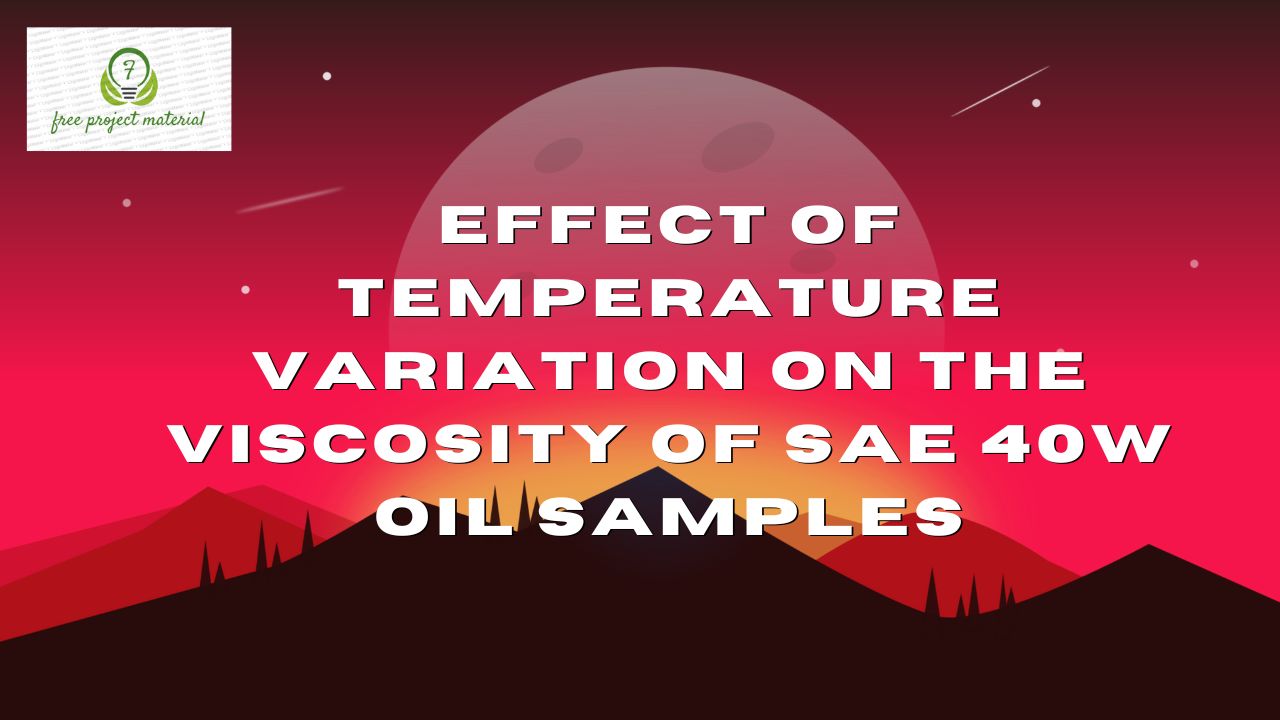ABSTRACT
The effect of temperature variation on the viscosity of SEA 40W oil samples, (Tonimas oil, Mobil oil, A-Z oil, Total oil and Kommaz) has been assessed. These viscosity values decrease as temperature increase. From this result Mobil oil has the lowest viscosity value while Komaz oil has the highest value. Models for calculating their viscosity value for a wide range of temperature are also developed.
Tonimas = 0.518 exp 3456.22
T
Mobil = 0.518 exp 2304.14
T
A-Z = 0.516 exp 4608.29
T
Komaz = 0.525 exp 5706.37
T
The result compares favourably with curves for some standard engine oil SAE low and SAE 30.
TABLE OF CONTENTS
Page
Title page – – – – – – – – – i
Certification – – – – – – – – ii
Dedication – – – – – – – – – iii
Acknowledgement – – – – – – – iv
Abstract – – – – – – – – – v
Table of Contents – – – – – – – – vi-viii
List of Tables – – – – – – – – ix
List of Figures – – – – – – – – x
CHAPTER ONE
1.0 Introduction – – – – – – – 1
1.1 Background of the Study – – – – – – 1-3
1.2 Aim and Objectives of the Study – – – – 4
1.3 Scope and Limitation of the Study – – – – 4
CHAPTER TWO
2.0 Literature Review – – – – – – – 5
2.1 Friction – – – – – – – – 5-6
2.2 Viscosity – – – – – – – – 6-8
2.3 Co-effect of Viscosity Index (iv) – – – – 8-9
2.4 Determination of Viscosity – – – – – 9-10
2.5 Effect of Temperature Variation of Engine Oil – – 10-11
2.5.1 Function and Properties of Oil – – – – 11-13
2.6 Classification and Grades of Engine Oils – – – 13-14
2.7 Application of the Effect of Temperature – – – 15
2.8 Choice of Oil Grade for Different Engine – – – 15-16
CHAPTER THREE
3.0 Material and Method – – – – – – 17
3.1 Materials – – – – – – – – 17
3.2 Methods – – – – – – – – 17-18
3.2.1 Experimental Procedure and Theory – – – – 18-19
2.3 Theory of Method – – – – – – 19-23
CHAPTER FOUR
4.0 Result and Discussion – – – – – – 24
4.1 Result of Analysis – – – – – – 24-26
4.2 Discussion – – – – – – – – 26-35
CHAPTER FIVE
5.0 Conclusion and Recommendation – – – – 36
5.1 Conclusion – – – – – – – – 36
5.2 Recommendation – – – – – – – 36-37
References
CHAPTER ONE
1.0 INTRODUCTION
1.1 BACKGROUND OF THE STUDY
The use of oil in human life is very essential in automobile engine. The use of engine oil is also very important since oil acts as sealer, cleaner and most especially as lubricants in the engine. It is also necessary to evaluate the oils with respect to viscosity especially as the oil is most used as a lubricant. When the engine start working, the frictional force between moving surface of the engine cause wear and wasteful dissipation of energy as heat. Friction as explained causes excessive wear on the surface parts of the engine an could lead to permanent damage and the heat resulting there from often causes additional damage to the surface as well as presenting the problems of providing adequate cooling to prevent overheating. Thus it is essential in engine design to make provision for oil as to reduce frictional effect and consequences.
Lubricant metal surface with engine oil may vastly reduce the effect this will save energy, elongate the life of the machine life, reduce maintenance last and generally, lead to improve performance (Ashcorf et al, 1958).
However, since the oil is used as a lubricant, it absorbs the heat dissipated and increase the vibration of its molecules. This ultimately leads to the expansion of the engine oil thereby reducing the oil resistance to flow.
Correspondingly, the viscosity of oil rapidly decrease as its temperature rises. This research work of the American Society of automobile engine (SAE)on the application of this effect of temperature on viscosity if engine oil yield the result of choice of engine oil grade for different engines. They recommended an arbitrary classification systems for engine oil in terms of viscosity only. The system which has been revised from time as long since been internally recognized. It established a numerical of oil and the specific minimum and maximum viscosity and stated temperature for oil to meet a particular grade.
Practically, the higher the grade number, the higher the viscosity of the oil. On this basis there are SAE 20, SAE 30, SAE 40, and SAE 50 grade that are intended primarily for normal temperature condition which suffix W grade in the range SAW OW SAE 5W, primarily for low temperature condition. Moreover, in common with other oils an increase in the temperature of oil will cause a decrease in its viscosity. As the effect will be quite pronounced with engine oil which are required to function over a very wide temperature range. They may be treated with further chemical additives known as viscosity index.
The term viscosity index is a number which indicates the resistance of oil to change in viscosity with temperature. The higher the values, the less will be improved resulted in the introduction to meet viscosity requirement of more than one SEA numbers, such as 20W/50. The advantage originally claimed for multigrade oils include easy starting of engine from cold with minimum oil consumption when hot.
1.2 AIMS AND OBJECTIVES OF THE STUDY
The work intend to device a means of finding the viscosity of different engine oil with temperature presented in an indirect tube and ball bearing measurement. This work shall serve as a references for technologist and engineers seeking to produce oil test or oil viscosity in the laboratory.
1.3 SCOPE AND LIMITATION OF THE STUDY
The work concentrates basically on oil samples. The measurement of viscosity with temperature were performed by indirect measurement and deduction, on direct measurement equipment was available.



